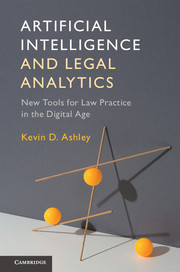Book contents
- Frontmatter
- Dedication
- Contents
- List of illustrations
- List of tables
- Acknowledgments
- PART I COMPUTATIONAL MODELS OF LEGAL REASONING
- PART II LEGAL TEXT ANALYTICS
- PART III CONNECTING COMPUTATIONAL REASONING MODELS AND LEGAL TEXTS
- 11 Conceptual Legal Information Retrieval for Cognitive Computing
- 12 Cognitive Computing Legal Apps
- Glossary
- Bibliography
- Index
12 - Cognitive Computing Legal Apps
from PART III - CONNECTING COMPUTATIONAL REASONING MODELS AND LEGAL TEXTS
Published online by Cambridge University Press: 13 July 2017
- Frontmatter
- Dedication
- Contents
- List of illustrations
- List of tables
- Acknowledgments
- PART I COMPUTATIONAL MODELS OF LEGAL REASONING
- PART II LEGAL TEXT ANALYTICS
- PART III CONNECTING COMPUTATIONAL REASONING MODELS AND LEGAL TEXTS
- 11 Conceptual Legal Information Retrieval for Cognitive Computing
- 12 Cognitive Computing Legal Apps
- Glossary
- Bibliography
- Index
Summary
INTRODUCTION
The prototype proposed in Section 11.5 would transform legal information retrieval into AR. If, as argued there, some of the legal knowledge representation frameworks of Part I's computational models of legal reasoning, argument, and prediction can be annotated automatically in case texts, then a legal app could accomplish more than conceptual legal information retrieval. It could support cognitive computing. This chapter describes a cognitive computing environment tailored to the legal domain in terms of tasks, interface, inputs, and outputs and explains how type systems and annotations based on the computational models will help humans frame hypotheses about legal arguments, make predictions, and test them against the documents in a corpus.
A hypothesis predicts how a legal issue should be decided, such as:
– The plaintiff should win the issue of trade secret misappropriation where defendant deceived it into disclosing its confidential product data even though the information could have easily been reverse engineered.
– The plaintiff can still show causation even though more than six months elapsed between the vaccination and the onset of the injury.
– Plaintiff's claim for conversion should fail where she had not actually caught the baseball, even though the defendant intentionally interfered with her attempt.
Posing and testing legal hypotheses like these is a paradigmatic cognitive computing activity in which humans and computers can collaborate, each performing the intelligent activities that they do best. Humans know the hypotheses that matter legally; the computer helps them to frame and test these hypotheses based on arguments citing cases and counterexamples. The type system annotations will enable a conceptual legal information system to retrieve case examples relevant to the hypotheses, generate summaries tailored to the users’ needs, construct arguments, and explain predictions.
The chapter discusses challenges that still need to be addressed in order to construct these new CCLAs. How can the computational models of case-based, rule-based, and value-based legal reasoning and argumentation be integrated with conceptual legal information retrieval? What roles do the type system and pipelined text annotators play in this integration? What kind of manual conceptual annotation of training sets of documents will be required? What will CCLAs look like? How will they help humans to frame and test legal hypotheses?
- Type
- Chapter
- Information
- Artificial Intelligence and Legal AnalyticsNew Tools for Law Practice in the Digital Age, pp. 350 - 392Publisher: Cambridge University PressPrint publication year: 2017



